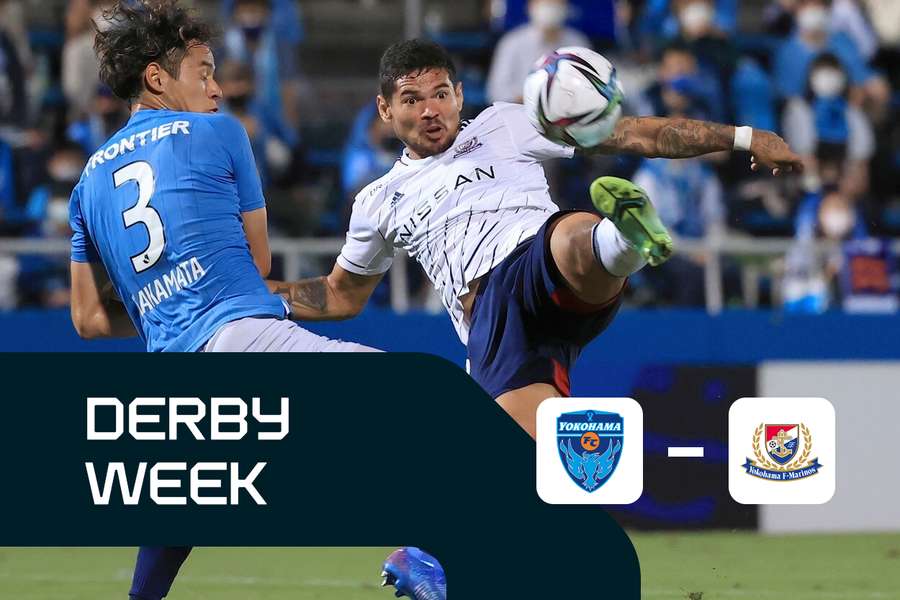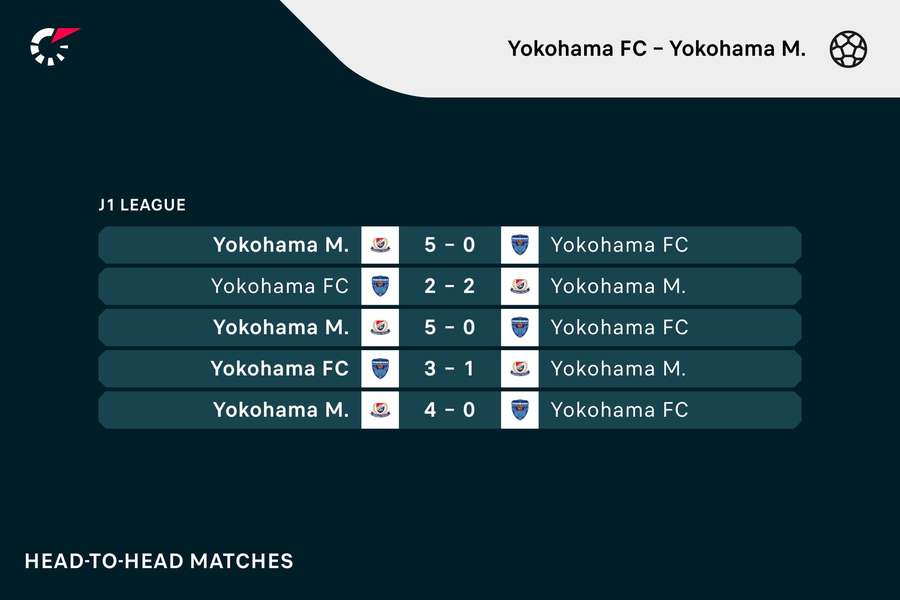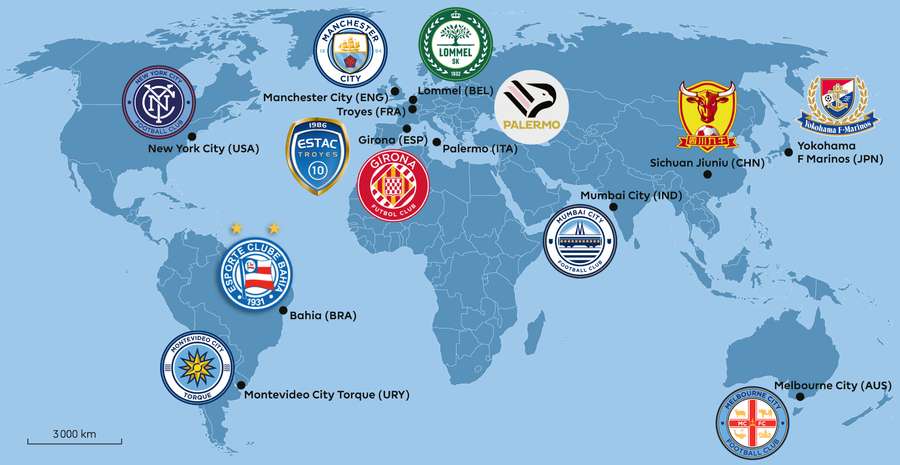Derby Week: Yokohama takes centre stage in Japan as historic merger fuels rivalry

Yokohama Flugels did indeed win the farewell title. They beat Shimizu S-Pulse 2-1. The club's existence came to an end, with players and staff either having to find new jobs or move to Yokohama Marinos, who "swallowed" the original Flugels in a merger. The new club was named Yokohama F. Marinos. The true Flugels fans, however, could not accept it.
The loss of their beloved club was hard for them to stomach, especially due to the fact that the remains of their team fell into the hands of their hated city rivals. As a result, they decided to join forces and form their own club. A club that would carry on the tradition of the Flugels.
In 1999, Yokohama FC saw the light of day - the first club in Japan founded and owned by a group of its supporters. The Yokohama football derby was quickly revived, which also took on a much stronger appeal.
The rise of Japanese football
Japan is not a big footballing country. Baseball is the most popular sport among the Japanese. It was not until 1965 that the Japanese football league took off and only then as an amateur competition for corporate teams.
Football teams were formed within large Japanese companies, where they were intended primarily as a leisure activity and entertainment for employees. Only national team matches attracted more (but still minor) fan and media interest compared to other parts of the world.
It was not until the late 1980s that Japanese clubs were able to sign their first professional contracts with footballers. In 1988, the idea of starting a fully professional football league was first mooted. One of the goals of this initiative was to establish clubs in cities that lacked top-level baseball.
The first season of the Japanese J.League was in 1993 (in Japan, the season runs within the calendar year). In 1999, the J2 League was formed, and in 2013 even a 3rd level, the J3 League.
In the 1990s, numerous reinforcements for local clubs from more football-advanced countries helped the Japanese fall in love with football - players like Zico and Dunga from Brazil or Yugoslavian star Dragan Stojkovic appeared in the Japanese competition.
In 2002, the position of football in Japan was greatly strengthened by the hosting of the World Cup, which the Land of the Rising Sun co-hosted with South Korea.
Teams from Yokohama
The two biggest football teams in Japan's second-largest city began to take shape in the 1960s and 1970s. Nissan FC was formed under the Nissan car company, and a club of the same name was formed under All Nippon Airways. Already these two teams were playing each other in matches that, thanks to the geographical proximity of the two companies, had the hallmark of a football derby.
In the inaugural year of the professional J.League (the 1993 season), the league consisted of 10 teams. Among the founding members were the successor clubs of the two established Yokohama teams.
The new professional clubs were no longer allowed to bear the names of the original founding companies and organizations - Nissan FC became the new Yokohama Marinos (because Yokohama is a very important Japanese port), and the Japanese Airlines team became the Yokohama Flugels (from the German word for wing and with an English 's' at the end to express the plural).

The Flugels further enriched their name with the abbreviation AS, which both symbolized the club's two main sponsors (the first letters of the companies ANA and Sato Labs) and the phrase 'Associazione Sportiva' and 'Association Sportive', known from Italian and French football respectively.
All these language plays, including the 'Spanish' Marinos in the case of the second Yokohama club, were intended to give the emerging professional football in Japan a touch of European and South American football quality. In keeping with this trend, and true to their names, the Marinos sought reinforcements mainly in South America, while the Flugels attracted mainly Germans.
As mentioned, the Flugels became extinct in 1999 but its fans founded the new Yokohama FC. The fact that the club rose like a phoenix from the ashes of its original entity is literally symbolized by the club's emblem. The new club, however, had to start from scratch to reach the heights of the top league. The Yokohama derby hung unattainably high in the clouds for a long time.
The world's oldest player
Back in 2001, Yokohama FC was already playing in the second league. In 2005, the team was reinforced by signing the 38-year-old Kazuyoshi Miura, a footballer with a lot of experience from the national team and stints in Brazil and Europe. But who would have expected him to stay at the club for another 18 years? And Miura is not finished yet!
He has played for 17 seasons at Yokohama FC. Today, at 56 years old, he is still a Yokohama player and is extending his remarkable career on loan at Oliveirense in the second division in Portugal. Miura is the oldest professional footballer in the world.
The derby
It was also thanks to Miura that Yokohama FC managed to qualify for the elite league in Japan in 2006. The 2007 season saw the first-ever derby against Yokohama F. Marinos - a team who were three-time league champions (five times in total including the Nissan FC era). In the first match of the season, the newcomers surprised the big favourites, as Yokohama FC managed to beat the Marinos 1-0.
In the second derby, however, the real strength of both teams was on display as the Marinos won 8-1. The opponent's humiliation was compounded by the behaviour of the Marinos ultras, who attacked the visiting team's fans. Many of them ended up in police cells. Yokohama FC failed to remain in the J1 League, as they were relegated to the 2nd league again for 12 long years.
The disparity of city rivals
The Yokohama derby has been played three times in the Imperial Cup since then, with Marinos winning every time. The Yokohama FC team appeared in the top division again in 2020 and 2021.
In the 2023 season, after a one-year second-division hiatus, Yokohama FC are once again struggling to stay up. Yokohama F. Marinos have the opposite concern - they are fighting to defend their championship title. If the Marinos succeed, they will be celebrating the league title for the eighth time. Incidentally, current Tottenham Hotspur coach Ange Postecoglou led the Marinos to their title in 2019.
The gap between the fan-based Yokohama FC and the successful Marinos doesn't seem to be getting any closer though. Moreover, the Marinos' position and financial capabilities have been greatly strengthened since 2014 by the club becoming part of the City Football Group portfolio - Sheikh Mansour's company in the United Arab Emirates, which already controls 12 clubs around the world, led by Manchester City.

The week's other upcoming derbies:
A match between two of the biggest rivals within Belarus was scheduled for this weekend. However, Dinamo Minsk's match with BATE Borisov was postponed due to Borisov's bid to break into Europe.
The global league schedule has not brought as many derby matches this week. Apart from the Yokohama derby, the only other major derby this week is the 'California Clasico'. Next week, it will be a derbies galore again!
Wednesday, August 30th
USA - Major League Soccer
San Jose Earthquakes vs. LA Galaxy
California Clasico
The California Clasico is the clash between the Los Angeles Galaxy and the San Jose Earthquakes. These clubs are two of the most traditional teams in American Major League Soccer. The rivalry between the teams gained momentum mostly in the early years of the new millennium, with both sides winning two championships between 2001 and 2005. They even faced each other in the 2001 MLS finals.
In addition, the rivalry between the clubs stems from the historical rivalry of northern California (San Jose) versus its southern part (Los Angeles). The two cities are only (from an American perspective) 580 kilometres apart. This means that trips by fans to derby matches on the rival's turf are common.
